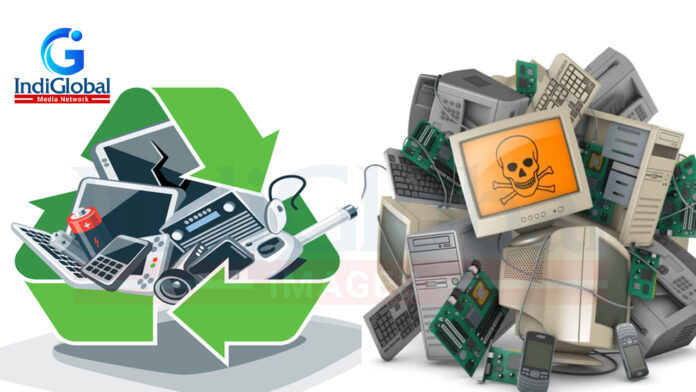IndiGlobal Bureau
The Gujarat Government is readying an e-waste policy. The Government will incentivise disposal of e-waste and will also make provisions to directly collect e-waste from the private sector. A separate network will be set up to collect e-waste or Information Communication Technology in Education (ICTE) assets at the village level as well. It may be noted that Gujarat ranks sixth in e-waste collection in the country with 30,569 tonnes collected in 2022 alone.
The condemned e-waste is to be disposed of through GPCB-registered e-waste recyclers. There are 40 authorized dismantlers and recyclers and 93 e-waste (electronic waste) producers in Gujarat. Gujarat is one of the leading e-waste producing states in the country. The new policy will ensure responsible e-waste handling by requiring recyclers to adhere to the e-waste (management) rules and prevent the leakage of sensitive data from condemned ICTE assets.
The plan is to establish IT committees, where each government office and department must form a committee comprising IT specialists, record branch heads, account branch members, and other relevant personnel which will assess the condition and lifespan of ICTE assets and recommend them for condemnation, based on the established criteria. When it comes to criteria for condemnation, ICTE assets must be deemed unfit because of factors like out-dated technology, non-repairable issues, or exceeding economical repair costs.
E-waste consists of discarded remains of electronic devices. “Collecting e-waste poses significant challenges like its improper disposal can release toxic materials like mercury and lead, which may pose a serious health risk to communities besides polluting the environment,” said a senior official in the state government.
The policy document suggests e-waste also contains toxic additives and hazardous substances like brominated flame retardants (BFRs), chlorofluorocarbons (CFCs) and hydrochlorofluorocarbons (HCFCs).
“These materials, if not properly controlled, can expose locals to high levels of contaminants, for instance, lead and cadmium, airborne pollutants and contaminated groundwater, which can cause cancers, neurological damage and diminished IQs,” said the policy document.

